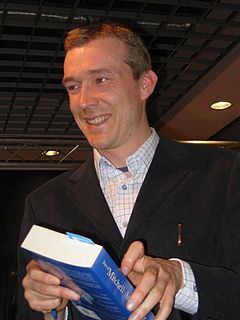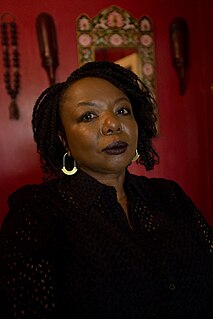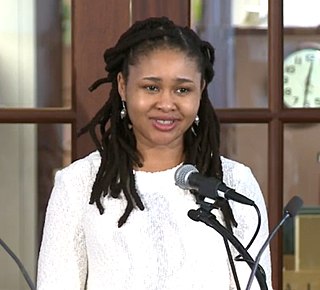
Zadie Smith FRSL is an English novelist, essayist, and short-story writer. Her debut novel, White Teeth (2000), immediately became a best-seller and won a number of awards. She has been a tenured professor in the Creative Writing faculty of New York University since September 2010.

David Stephen Mitchell is an English novelist, television writer, and screenwriter.

Nuruddin Farah is a Somali novelist. His first novel, From a Crooked Rib, was published in 1970 and has been described as "one of the cornerstones of modern East African literature today". He has also written plays both for stage and radio, as well as short stories and essays. Since leaving Somalia in the 1970s he has lived and taught in numerous countries, including the United States, Britain, Germany, Italy, Sweden, Sudan, India, Uganda, Nigeria and South Africa.

Helen Oyeyemi FRSL is a British novelist and writer of short stories.
The Guardian First Book Award was a literary award presented by The Guardian newspaper. It annually recognised one book by a new writer. It was established in 1999, replacing the Guardian Fiction Award or Guardian Fiction Prize that the newspaper had sponsored from 1965. The Guardian First Book Award was discontinued in 2016, with the 2015 awards being the last.

Helon Habila Ngalabak is a Nigerian novelist and poet, whose writing has won many prizes, including the Caine Prize in 2001. He worked as a lecturer and journalist in Nigeria before moving in 2002 to England, where he was a Chevening Scholar at the University of East Anglia, and now teaches creative writing at George Mason University, Fairfax, Virginia.
Tahmima Anam is a Bangladeshi-born British writer, novelist and columnist. Her first novel, A Golden Age (2007), was the Best First Book winner of the 2008 Commonwealth Writers' Prizes. Her follow-up novel, The Good Muslim, was nominated for the 2011 Man Asian Literary Prize. She is the granddaughter of Abul Mansur Ahmed and daughter of Mahfuz Anam.

Lavinia Elaine Greenlaw is an English poet, novelist and non-fiction writer. She won the Prix du Premier Roman with her first novel and her poetry has been shortlisted for awards that include the T. S. Eliot Prize, Forward Prize and Whitbread Poetry Prize. Her 2014 Costa Poetry Award was for A Double Sorrow: A Version of Troilus and Criseyde. Greenlaw currently holds the post of Professor of Creative Writing (Poetry) at Royal Holloway, University of London.
Maria Joan Hyland is an ex-lawyer and the author of three novels: How the Light Gets In (2004), Carry Me Down (2006) and This is How (2009). Hyland is a lecturer in creative writing in the Centre for New Writing at the University of Manchester. Carry Me Down (2006) was shortlisted for the Man Booker Prize and won the Hawthornden Prize and the Encore Prize.

Black Mamba Boy is a 2010 novel by the Somali-British author Nadifa Mohamed.
Evelyn Rose Strange "Evie" Wyld is an Anglo-Australian author. Her first novel, After the Fire, A Still Small Voice, won the John Llewellyn Rhys Prize in 2009, and her second novel, All the Birds, Singing, won the Encore Award in 2013 and the Miles Franklin Award in 2014. Her third novel, The Bass Rock, won the Stella Prize in 2021.
Ned Beauman is a British novelist, journalist and screenwriter. The author of five novels, he was selected as one of the Best of Young British Novelists by Granta magazine in 2013.

The Orchard of Lost Souls is a 2013 novel by the Somali-British author Nadifa Mohamed. It is set in Somalia on the eve of the civil war. Her second book, coming four years after her award-winning debut work Black Mamba Boy (2009), it was published by Simon & Schuster.

Ellah Wakatama, OBE, Hon. FRSL, is Editor-at-Large at Canongate Books, a senior Research Fellow at Manchester University and Chair of the AKO Caine Prize for African Writing. She was the founding Publishing Director of the Indigo Press. A London-based editor and critic, she was on the judging panel of the 2017 International Dublin Literary Award and the 2015 Man Booker Prize. In 2016, she was Visiting Professor & Global Intercultural Scholar at Goshen College, Indiana, and was Guest Master for the 2016 Gabriel Garcia Marquez Foundation international journalism fellowship in Cartagena, Colombia. The former deputy editor of Granta magazine, she was senior editor at Jonathan Cape, Random House and assistant editor at Penguin. She is series editor of the Kwani? Manuscript Project and the editor of the anthologies Africa39 and Safe House: Explorations in Creative Nonfiction.

Chinelo Okparanta is a Nigerian-American novelist and short-story writer. She was born in Port Harcourt, Nigeria, where she was raised until the age of 10, when she emigrated to the United States with her family.

Carla Namwali Serpell is an American and Zambian writer who teaches in the United States. In April 2014, she was named on Hay Festival's Africa39 list of 39 Sub-Saharan African writers aged under 40 with the potential and talent to define trends in African literature. Her short story "The Sack" won the 2015 Caine Prize for African fiction in English. In 2020, Serpell won the Belles-lettres category Grand Prix of Literary Associations 2019 for her debut novel The Old Drift.

Margaret Yvonne Busby,, Hon. FRSL, also known as Nana Akua Ackon, is a Ghanaian-born publisher, editor, writer and broadcaster, resident in the UK. She was Britain's youngest and first black female book publisher when she and Clive Allison (1944–2011) co-founded the London-based publishing house Allison and Busby in the 1960s. She edited the anthology Daughters of Africa (1992), and its 2019 follow-up New Daughters of Africa. She is a recipient of the Benson Medal from the Royal Society of Literature. In 2020 she was voted one of the "100 Great Black Britons". In 2021, she was honoured with the London Book Fair Lifetime Achievement Award.

Anuk Arudpragasam is a Sri Lankan Tamil novelist writing in English and Tamil. His debut novel The Story of a Brief Marriage was published in 2016 by Flatiron Books/Granta Books and was subsequently translated into French, German, Czech, Mandarin, Dutch and Italian. The novel, which takes place in 2009 during the final stages of the Sri Lankan Civil War, won the DSC Prize for South Asian Literature, and was shortlisted for the Dylan Thomas Prize and the German Internationaler Literaturpreis. His second novel, A Passage North, was published in 2021 and was shortlisted for the Booker Prize.

The 2021 Booker Prize for Fiction was announced on 3 November 2021, during a ceremony at the BBC Radio Theatre. The longlist was announced on 27 July 2021. The shortlist was announced on 14 September 2021. The Prize was awarded to Damon Galgut for his novel, The Promise, receiving £50,000. He is the third South African to win the prize, after J. M. Coetzee and Nadine Gordimer.

The Fortune Men is a 2021 novel by the Somali-British author Nadifa Mohamed, published on 27 May 2021, by the Viking Books imprint of Penguin General.















